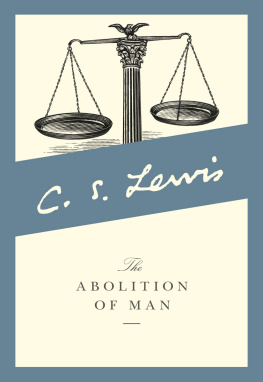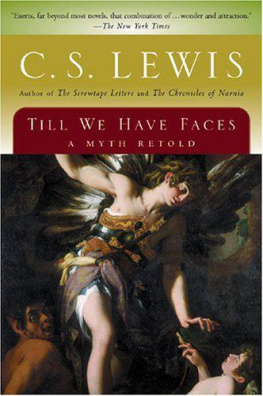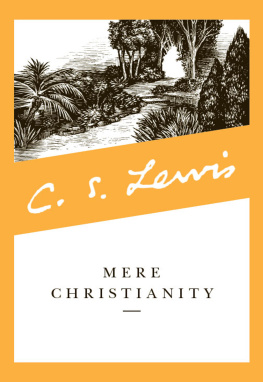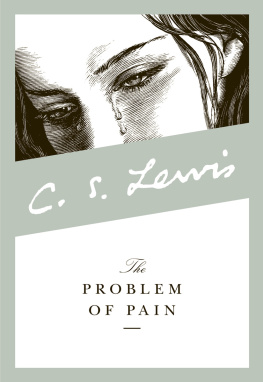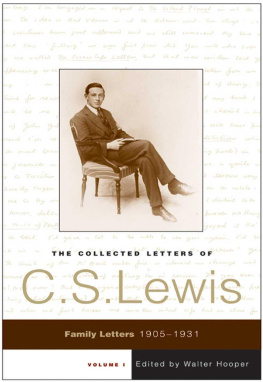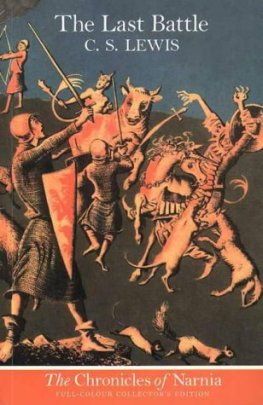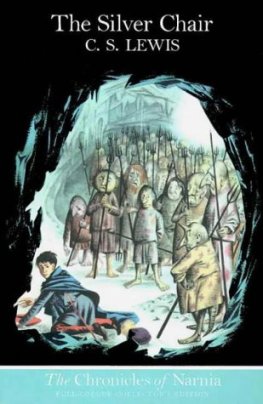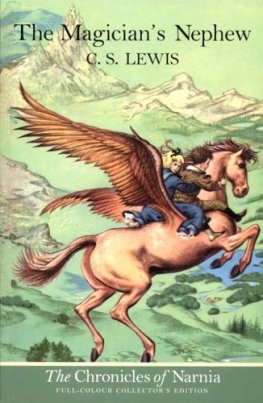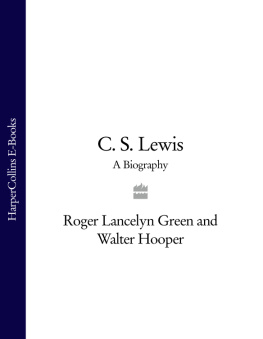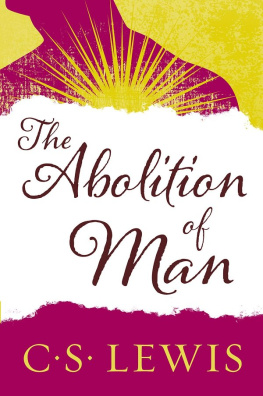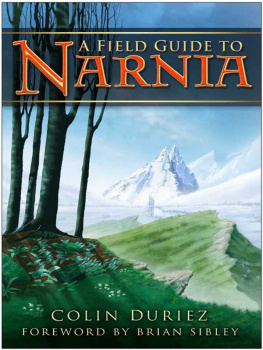Reflections on Education with Special Reference to the Teaching of English in the Upper Forms of Schools
C. S. Lewis
C ONFUCIUS , Analects II. 16
MEN WITHOUT CHESTS
So he sent the word to slay
And slew the little childer.
TRADITIONAL CAROL
I doubt whether we are sufficiently attentive to the importance of elementary text books. That is why I have chosen as the starting-point for these lectures a little book on English intended for boys and girls in the upper forms of schools. I do not think the authors of this book (there were two of them) intended any harm, and I owe them, or their publisher, good language for sending me a complimentary copy. At the same time I shall have nothing good to say of them. Here is a pretty predicament. I do not want to pillory two modest practising schoolmasters who were doing the best they knew: but I cannot be silent about what I think the actual tendency of their work. I therefore propose to conceal their names. I shall refer to these gentlemen as Gaius and Titius and to their book as The Green Book . But I promise you there is such a book and I have it on my shelves.
In their second chapter Gaius and Titius quote the well-known story of Coleridge at the waterfall. You remember that there were two tourists present: that one called it sublime and the other pretty; and that Coleridge mentally endorsed the first judgement and rejected the second with disgust. Gaius and Titius comment as follows: When the man said This is sublime , he appeared to be making a remark about the waterfallActuallyhe was not making a remark about the waterfall, but a remark about his own feelings. What he was saying was really I have feelings associated in my mind with the word Sublime , or shortly, I have sublime feelings . Here are a good many deep questions settled in a pretty summary fashion. But the authors are not yet finished. They add: This confusion is continually present in language as we use it. We appear to be saying something very important about something: and actually we are only saying something about our own feelings.1
Before considering the issues really raised by this momentous little paragraph (designed, you will remember, for the upper forms of schools) we must eliminate one mere confusion into which Gaius and Titius have fallen. Even on their own viewon any conceivable viewthe man who says This is sublime cannot mean I have sublime feelings . Even if it were granted that such qualities as sublimity were simply and solely projected into things from our own emotions, yet the emotions which prompt the projection are the correlatives, and therefore almost the opposites, of the qualities projected. The feelings which make a man call an object sublime are not sublime feelings but feelings of veneration. If This is sublime is to be reduced at all to a statement about the speakers feelings, the proper translation would be I have humble feelings . If the view held by Gaius and Titius were consistently applied it would lead to obvious absurdities. It would force them to maintain that You are contemptible means I have contemptible feelings : in fact that Your feelings are contemptible means My feelings are contemptible . But we need not delay over this which is the very pons asinorum of our subject. It would be unjust to Gaius and Titius themselves to emphasize what was doubtless a mere inadvertence.
The schoolboy who reads this passage in The Green Book will believe two propositions: firstly, that all sentences containing a predicate of value are statements about the emotional state of the speaker, and secondly, that all such statements are unimportant. It is true that Gaius and Titius have said neither of these things in so many words. They have treated only one particular predicate of value ( sublime ) as a word descriptive of the speakers emotions. The pupils are left to do for themselves the work of extending the same treatment to all predicates of value: and no slightest obstacle to such extension is placed in their way. The authors may or may not desire the extension: they may never have given the question five minutes serious thought in their lives. I am not concerned with what they desired but with the effect their book will certainly have on the schoolboys mind. In the same way, they have not said that judgements of value are unimportant. Their words are that we appear to be saying something very important when in reality we are only saying something about our own feelings. No schoolboy will be able to resist the suggestion brought to bear upon him by that word only . I do not mean, of course, that he will make any conscious inference from what he reads to a general philosophical theory that all values are subjective and trivial. The very power of Gaius and Titius depends on the fact that they are dealing with a boy: a boy who thinks he is doing his English prep and has no notion that ethics, theology, and politics are all at stake. It is not a theory they put into his mind, but an assumption, which ten years hence, its origin forgotten and its presence unconscious, will condition him to take one side in a controversy which he has never recognized as a controversy at all. The authors themselves, I suspect, hardly know what they are doing to the boy, and he cannot know what is being done to him.
Before considering the philosophical credentials of the position which Gaius and Titius have adopted about value, I should like to show its practical results on the educational procedure. In their fourth chapter they quote a silly advertisement of a pleasure cruise and proceed to inoculate their pupils against the sort of writing it exhibits.2 The advertisement tells us that those who buy tickets for this cruise will go across the Western Ocean where Drake of Devon sailed, adventuring after the treasures of the Indies, and bringing home themselves also a treasure of golden hours and glowing colours. It is a bad bit of writing, of course: a venal and bathetic exploitation of those emotions of awe and pleasure which men feel in visiting places that have striking associations with history or legend. If Gaius and Titius were to stick to their last and teach their readers (as they promised to do) the art of English composition, it was their business to put this advertisement side by side with passages from great writers in which the very emotion is well expressed, and then show where the difference lies.
They might have used Johnsons famous passage from the Western Islands , which concludes: That man is little to be envied, whose patriotism would not gain force upon the plain of Marathon, or whose piety would not grow warmer among the ruins of Iona.3 They might have taken that place in The Prelude where Wordsworth describes how the antiquity of London first descended on his mind with Weight and power, Power growing under weight.4 A lesson which had laid such literature beside the advertisement and really discriminated the good from the bad would have been a lesson worth teaching. There would have been some blood and sap in itthe trees of knowledge and of life growing together. It would also have had the merit of being a lesson in literature: a subject of which Gaius and Titius, despite their professed purpose, are uncommonly shy.
What they actually do is to point out that the luxurious motor-vessel wont really sail where Drake did, that the tourists will not have any adventures, that the treasures they bring home will be of a purely metaphorical nature, and that a trip to Margate might provide all the pleasure and rest they required.5 All this is very true: talents inferior to those of Gaius and Titius would have sufficed to discover it. What they have not noticed, or not cared about, is that a very similar treatment could be applied to much good literature which treats the same emotion. What, after all, can the history of early British Christianity, in pure reason, add to the motives for piety as they exist in the eighteenth century? Why should Mr Wordsworths inn be more comfortable or the air of London more healthy because London has existed for a long time? Or, if there is indeed any obstacle which will prevent a critic from debunking Johnson and Wordsworth (and Lamb, and Virgil, and Thomas Browne, and Mr de la Mare) as The Green Book debunks the advertisement, Gaius and Titius have given their schoolboy readers no faintest help to its discovery.

